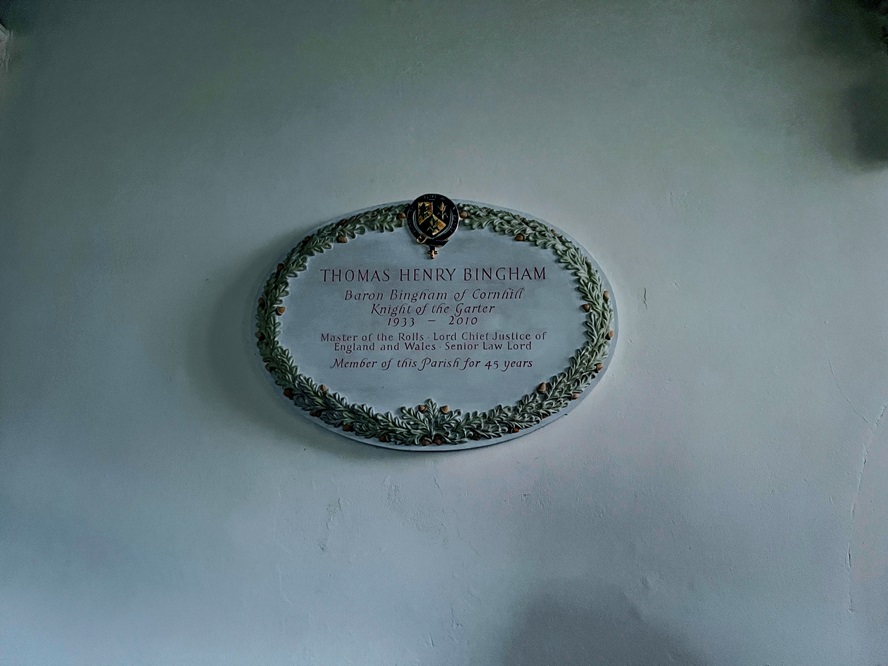Boughrood, Tom Bingham and the rule of law

Dr Huw Evans, academic lawyer, Cardiff Metropolitan University
The village of Boughrood in Radnorshire is situated on the river Wye between Builth Wells and Hay-on-Wye. It faces Llyswen on the other side of the river.
It is peaceful, which suggests that the rule of law prevails.
But other places are peaceful too, and they are not immediately associated with the rule of law.
Boughrood is different because of its association with Tom Bingham (1933-2010) the distinguished lawyer who at various times was Master of the Rolls, Lord Chief Justice, and senior judge in the House of Lords.
There is a memorial to Bingham in Boughrood Church, St Cynog’s, which records his 45 years of association with the parish.
This association is also reflected in his title of Baron Bingham of Cornhill; not Cornhill in central London, but the name of the Boughrood property in which he resided.

Bingham was not born Welsh, but he made Wales his home. He could be described as a citizen of Wales, perhaps.
There are many aspects of Bingham’s career worthy of exploration. The article focuses on his contribution to promoting the rule of law.
Bingham’s book
His book The Rule of Law was published shortly before his death and was well received. He set out the importance of the rule of law, as he saw it, defined the concept, and argued that it encompassed eight principles: law should be accessible; legal questions should be resolved by application of the law, not discretion; there should be equality of the law between people; state power should be properly exercised; law should give adequate protection to human rights; there should be effective dispute resolution mechanisms; people should have a fair trial or hearing; and the rule of law should apply to the international (as well as the national) legal order.
Constitutional Reform Act 2005
Let’s first place the rule of law in its UK legal context. Section 1 of the Constitutional Reform Act 2005 says that the Act ‘does not adversely affect the existing constitutional principle of the rule of law’.
Thus, the rule of law is recognised as fundamental in UK constitutional arrangements. But nowhere is the term defined, and in that absence, there is a danger that it is claimed by competing people to suit their outlook.
Bingham directly challenges that position by putting meat on metaphorical bones. He provides a general definition supported by the eight principles he argues the concept encompasses.
Human rights
Arguably, the most significant of his eight principles is that the law must afford adequate protection of fundamental human rights. Fundamental rights he identifies include: the right to life; prohibition of torture, inhuman and degrading treatment; prohibition of slavery and forced labour; the right to liberty and security; the right to a fair trial; the right to liberty and security; the right to respect for private and family life; freedom of thought conscience and religion; freedom of expression; freedom of assembly and association; and freedom from discrimination in the enjoyment of those rights.
This may seem uncontroversial until it is realised that other legal commentators have argued that for reasons of certainty the rule of law should be confined to procedural integrity and not concerned with substantive content.
Thus, genocide might fall within the rule of law if authorised through due legal process as it might have been done, for example, in Nazi Germany.
As legal theorist Joseph Raz noted: ‘the law may… institute slavery within the rule of law’.
This approach to the rule of law has been described as ‘thin’. Bingham rejects this in favour of his ‘thick’ approach: i.e., including protection of fundamental human rights. His broad point is that if the rule of law is not also concerned with substantive content, it materially undermines the central message about its virtue.
One example about the rule of law and its connection with protection of fundamental human rights concerns the approach a state takes to protecting the human rights of those who are not its citizens, most obviously seen towards people seeking sanctuary in that state: e.g. fleeing from persecution in a third country or seeking better (perceived) economic opportunity.
There are calls from some to withdraw from the European Convention on Human Rights, including former candidate for Tory leader, Robert Jenrick, because international human rights law, as they see it, unacceptably restricts the way in which the UK can deal with non-UK nationals who seek UK access.
Those making the calls for ECHR withdrawal would undoubtedly argue that the withdrawal and the consequent domestic legal arrangements should be lawfully enacted, in which case, they would most probably argue too that there would be rule of law compliance, as they see it.
But there would be non-compliance under Bingham’s definition as withdrawal, surely, would inevitably mean there would be inadequate protection of the human rights of those most directly affected.
Accessibility of law
One of Bingham’s principles concerns law being accessible. This is necessary so that people are aware of their legal rights and obligations and can adjust their conduct accordingly. A further justification is to set out clear and predictable rules that facilitate how society functions: e.g. contract law, property law, probate law, and so on.
The position flowing from the absence of a separate legal jurisdiction for Wales must fall foul of this principle. Because of devolution a separate body of Welsh law has developed. Yet the legal jurisdiction is England and Wales, whereby Welsh law extends to England and Wales but applies only in Wales, complicated by English only law applying only in England etc.
Unnecessary complication and confusion arise which does not help anyone. Separate jurisdiction would promote access to the law because of the greater clarity arising.
International legal order
Bingham argues that the rule of law applies as much to the international legal order as to the national legal order. That this is a separate principle might seem surprising as logic suggests the rule of law should apply in all contexts.
But its inclusion reflects a practical reality. State actors often purport to follow the rule of law domestically but fail to do so internationally.
For example, Bingham persuasively argues that the UK was guilty of not following the rule of law in the 2003 US-led Iraq invasion. Despite UK government assertion to the contrary, he says that there was no international law justification for the invasion.
In 2024 there are a range of international conflicts which can reasonably be argued to involve action outside the rule of law: e.g. in Ukraine and the Middle East. The position has not been helped when Western liberal democracies ostensibly promote the rule of law but have a recent record themselves of not having done so internationally.
Russia, for example, in justifying its Ukraine invasion can reasonably make comparison with the US-led Iraq invasion. Is it unsurprising that neutral third-party states do not see substantial difference between the two positions?
Bingham’s legacy
Other parts of Bingham’s writing can be discussed but, hopefully, the above gives an insight into the man, his message, and his ability to articulate a concept and place it in a practical application for the purposes of a better world. Moreover, what he says has continuing and real relevance.
We started in Boughrood and shall finish there. Next time you go there, see it on a map, hear it mentioned, or it otherwise crosses your mind, remember Tom Bingham and the rule of law.
Support our Nation today
For the price of a cup of coffee a month you can help us create an independent, not-for-profit, national news service for the people of Wales, by the people of Wales.








Before reading this article, I’d never heard of Tom Bingham, much less his work ‘The Rule of Law’, and hadn’t considered the significant implications of, and distinctions between legal procedure and substantive content, particularly in their international context. In a world where intensifying global conflict and poverty are generating high levels of migration, the law, more than ever, needs to be accessible, clear and ‘thickened’ to protect the most vulnerable, rather than used as a procedural tool to justify invasion or as an ideological weapon to withdraw fundamental human rights.